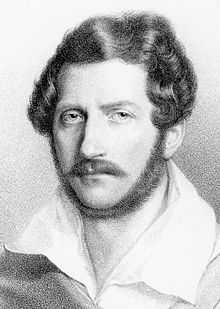Enrico di Borgogna
Enrico di Borgogna (Henry of Burgundy) is an opera eroica or "heroic" opera in two acts by Gaetano Donizetti. Bartolomeo Merelli (who later, as Intendant at La Scala, was to commission Verdi's first opera), wrote the Italian libretto based on Der Graf von Burgund by August von Kotzebue.
Enrico di Borgogna was the third opera composed by Donizetti, but the first to be performed. It premiered on 14 November 1818 at the Teatro San Luca in Venice. In spite of difficulties at the premiere, the critic of Nuovo osservatore veneziano noted of Donizetti that "one cannot but recognize a regular handling and expressive quality in his style. For these, the public wanted to salute Signor Donizetti on stage at the end of the opera".[1]
For the first time in 192 years, the opera was presented at the Vadstena Academy in Sweden in July/August 2012.[2]
Roles
| Role | Voice type | Premiere Cast, 14 November 1818 (Conductor:) |
|---|---|---|
| Brunone | baritone | Giuseppe Fioravanti |
| Elisa | mezzo-soprano | Adelina Catalani |
| Enrico | contralto | Fanny Eckerlin |
| Geltrude | soprano | Adelaide Cassago |
| Guido | tenor | Eliodoro Spech |
| Gilberto | bass | Andrea Verni |
| Nicola | tenor | Pietro Verducci |
| Pietro | tenor | Giuseppe Fusconi |
Synopsis
The king has been deceived and murdered by his own brother. The king's bodyguards, Pietro and Brunone, manage to escape with Enrico, the first-born son of the king and the rightful heir to the throne. During Pietro’s escape, his wife is killed before they can get to safety. Brunone stays in the castle, becoming the new king's bodyguard.
- Time: The Middle Ages
- Place: Burgundy
Act 1
Nicola, the young shepherd, and his friends find the old man Pietro weeping before by his wife's grave, as he has done many times. They try to cheer him up, and, after that, carry on with their work, leaving Pietro alone.
Enrico, now a young man, is on his way home from fishing; he is tired of the simple life up in the mountains and is longing for something more exiting. He is also thinking about the girl of his dreams, Elisa, whom he has several times in the mountains.
Brunone arrives at Pietro's cabin and tells him that the king is dead and that his weak son Guido has taken his place. He explains that this is the time to strike if they want to see Enrico installed on the throne. When Enrico arrives and learns the truth, they give him his father's sword and he decides to accept his fate.
In the castle the new king Guido and his jester Gilberto are planning Guido's marriage with Elisa, but she has just lost her father is still mourning; she refuses to marry Guido, but he forces her to accept his proposal, and the wedding plans begin.
Recordings
- A Hundred Years of Italian Opera contains Enrico's Act I: Recitative and Cavatina, Elisa! Elisa! Oh! me infelice Care aurette che spiegate, sung by Della Jones. Opera Rara ORCH103; also in The Young Donizetti Opera Rara ORR 229
References
Notes
- ↑ Osborne 1994, p. 142
- ↑ Vadstena Academy official website Retrieved 2 February 2012
Cited sources
- Ashbrook, William and Sarah Hibberd (2001), in Holden, Amanda (Ed.), The New Penguin Opera Guide, New York: Penguin Putnam. ISBN 0-14-029312-4. pp. 224 – 247.
- Osborne, Charles, (1994), The Bel Canto Operas of Rossini, Donizetti, and Bellini, Portland, Oregon: Amadeus Press. ISBN 0-931340-71-3
- Weinstock, Herbert (1963), Donizetti and the World of Opera in Italy, Paris, and Vienna in the First Half of the Nineteenth Century, New York: Pantheon Books. LCCN 63-13703
Other sources
- Allitt, John Stewart (1991), Donizetti: in the light of Romanticism and the teaching of Johann Simon Mayr, Shaftesbury: Element Books, Ltd (UK); Rockport, MA: Element, Inc.(USA)
- Ashbrook, William (1998), "Donizetti, Gaetano" in Stanley Sadie (Ed.), The New Grove Dictionary of Opera, Vol. One. London: MacMillan Publishers, Inc. ISBN 0-333-73432-7 ISBN 1-56159-228-5
- Loewenberg, Alfred (1970). Annals of Opera, 1597-1940, 2nd edition. Rowman and Littlefield
- Sadie, Stanley, (Ed.); John Tyrell (Exec. Ed.) (2004), The New Grove Dictionary of Music and Musicians. 2nd edition. London: Macmillan. ISBN 978-0-19-517067-2 (hardcover). ISBN 0-19-517067-9 OCLC 419285866 (eBook).
External links
- Casaglia, Gherardo (2005).[http://www.amadeusonline.eu/almanacco.php?Testo=Enrico_di_Borgogna&Parola=Stringa "Enrico di Borgogna"]. Almanacco Amadeus (Italian).
- Donizetti Society (London) website
